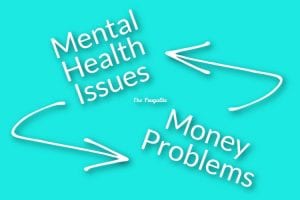(Psst: The FTC wants me to remind you that this website contains affiliate links. That means if you make a purchase from a link you click on, I might receive a small commission. This does not increase the price you’ll pay for that item nor does it decrease the awesomeness of the item. ~ Daisy)
By the author of the online course Growing Self-Sufficiency: The Whole Picture
We Frugalites are a thrifty lot! If there’s a dollar to save, there are many Frugalites in this community more than capable of saving $1.10! Over the past couple of years, I have been writing for The Frugalite, I have read a lot of wisdom in the comments sections of the articles as our wonderful community of readers shares their own ideas and experiences.
In this article, I wanted to take a closer look at the values related to life that are beyond money. My sources for these ideas are the Frugalite community itself, my own experiences as a Frugalite, and the longest study on health and happiness in existence, the Harvard Study of Adult Development, which has been collecting data on health and happiness for over 80 years now. I saw an article on this study in the media, and it got me thinking about what truly makes us healthy and happy in life and what Frugalites might have to say about it.
The Harvard Study – Background
In 1938, a study began with 268 second-year students at Harvard University. They were all men, as it was still a male-only university at that time. Now, all these years later, only 19 of these men are still alive, all in their mid-nineties. It is interesting to note that former president John F. Kennedy was in the original group of study participants.
Year after year, data was collected on these men as they moved through life. At the same time, our understanding of health and happiness has also changed dramatically as our society has also changed. Over the years, the study expanded to include the children of some of the participants, some of their wives, and also a comparison group in the inner city. This allowed the researchers to try and get a better understanding of whether the social status of the Harvard students was a main effect on their health outcomes or not. The researchers were interested in having results that could help us understand the lives not only of Harvard university students but also folks in the wider society from a larger range of social status.
A study of this length of time is truly unique and has provided some surprising findings. What researchers thought would predict good health in old age was not what actually did! For example, in the earlier days, genetics and long-lived ancestors were thought to be the best predictors. Through the course of this study, researchers were surprised to find that how satisfied people were with their relationships was actually the best predictor of how healthy they would be later in life.
Quality Relationships
Psychiatrist George Valliant was the leader of the Harvard study from 1974 until 2004. I think he puts it best in terms of the major finding of the study: “When the study began, nobody cared about empathy or attachment. But the key to healthy aging is relationships, relationships, relationships.” When I first read this, I was also surprised. I was delighted to see what I considered to be intuitive wisdom coming into mainstream medical research.
What I found fascinating was that close, quality relationships supported people’s happiness and health more than “money or fame…social class, IQ or even genes. That finding proved true across the board among both the Harvard men and the inner city participants.”
I will finish this section with a caveat, however! There were findings that avoiding certain behaviors already known to be health-harming was a good idea, so keeping close to your ideal weight and avoiding alcohol abuse and smoking…these are things that the study findings also supported. However, when the researchers analyzed the data, time and time again it did point to the importance of quality relationships.
What does this mean for each of us today? For me, it only underlines the importance of considering my relationships to be a part of me and of my health. By nurturing our relationships just as we nurture the health of our body, I think that we can not only improve our health but, even more importantly, get close to the true meaning of life.
Joy
One of the things we now know about happiness is that about 25% of our experience of happiness comes from our daily habits (the other 50% is likely genetic, and the other 25% comes from the circumstances that surround us that are out of our control). As the researchers followed the study participants as they aged, they found that the ability to see life with greater wisdom and “not sweat the small stuff” had a positive effect on people’s happiness. Importantly, as they grew older, folks realized that life was short and were simply more likely to reach out for experiences they found brought them joy TODAY.
I think this is an important finding that we can apply to our lives at any age, and I thank the study participants for their wisdom. If there’s something that brought you joy in the past, why aren’t you doing that now? You don’t have to be a da Vinci to find joy in painting. You aren’t likely to get to Carnegie Hall, but you might find great joy in finally learning to play the piano. If you’re a frazzled and exhausted parent of young children, this might mean taking a few minutes to send joyful photos of you and your young ones to friends and family you haven’t had a chance to connect with lately. Or you might find a way to get a few extra zzzs when you really need them. It is different for everyone. What brings you real joy?
Frugalite Pride
OK, I’m a bit biased, but I think that we Frugalites are ahead of the curve on this one. The wisdom of the community comes out in the comments sections, and we have spoken: there is much more to life than money. We take pride in our ability to stretch our dollars and improvise as needed. In doing that, we keep our eyes on the higher values that inform our lives. Frugalites are also quite generous with sharing our insights and lessons learned with others, showing yet another value that leads the way to connection and joy and has nothing to do with money or fame.
In my own work as a writer, I have even coined a word for this: “happyless.” I am happy with less in my life; that is, less of the things that society tries to make me buy. However, I have more of the things in my life that I truly value: dear friends, loving family, and my life close to the land. In doing this, I believe that I have found a more stable and deeper type of happiness: one that sustains me through the inevitable challenges of life; it is a deep, peaceful contentment that makes my soul smile. It is not the shallow, fleeting happiness that comes from the latest iPhone or a few thousand likes on a FB post.
Can you tell I’m passionate about this? You betcha! To offer support to others who wish to become healthy and self-sufficient in a truly holistic way, I have launched an eight-week course on my website that is available to everyone at no charge. [LINK: That’s where I share my best tips gained through own journey towards health and contentment, and true self-sufficiency.
Maybe the best things in life really are FREE!
Did we Frugalites really need a Harvard research study to tell us this? Do the findings of this study agree with your own beliefs about life? Do you have another Frugalite value that you can share with us? Please tell us in the comments section!
About Colette
Colette is passionate about sharing her knowledge of thrifty living and self-sufficiency. She has developed her skills in self-reliance living in the suburbs, the city, and more recently, on her own Half-Acre Homestead. Colette lived five years completely off-grid and without running water in an eight by 24 foot tiny home while designing and building her own 18 by 24-foot eco-cabin. Her website, Half Acre Homestead is attracting followers from around the world who want to become more self-sufficient. Colette invites you to stop by the Homestead and check out all of the great resources including the practical How To Guides, A Tiny Home Resource Center and her organic gardening stories on her blog. She shares her wholistic model (body/mind/spirit) for achieving self-sufficiency in her Free Course, “Growing Self-Sufficiency: The Whole Picture.” Stop by the Homestead today to register free of charge!












6 thoughts on “Three Things Money Can’t Buy”
Society has put a premium on money – advertisements abound for things, appearance – aka requires money. I like money as much as the next person but it doesn’t drive my life. It doesn’t how much an employer pays me IF I hate my job. But far too many have the golden handcuffs – lifestyle/choices/prior choices or decisions require X amount of income. Thus s/he is stuck at a job s/he hates. You need an outside hobby and job you like IMHO.
It is nice to have a financial cushion which allows me to support local charities. Or to take advantage of good deal on food, tools, or land.
Two sayings come to mind – you can’t take it with you and no one headstone says “wished s/he had spent more time at work”.
Hi Selena, Thank you so much for sharing your thoughts and your own Frugalite values with the community. Yes, I think that many face difficulties with jobs that they hate and I agree that having an outside hobby that is enjoyable can at least take some of the bite out of that. You are fortunate to have a financial cushion, as I know many are facing difficulties these days.
The saying you shared “You can’t take it with you.” reminded me of my early days as a Candy Striper in the long term care section of a local hospital. I was so young and found many of the very old folks kind of scary, to be honest. I helped them do their hair, and visited and talked with them. Many shared meaningful accomplishments of their lives…one woman was the first female principal in our local school board. I recall what I noticed in their rooms….the dreary hospital rooms were filled with photos of their loved ones….no one, I noticed, had a photo of their cars or their houses. Not a one! That taught me a valuable lesson quite early on in life, as I had met many good people nearing the end of theirs, God Bless them all!
My extended family has always remained in close touch even though we are scattered. We know activities that we are involved in—a grandniece is a pro disc golfer which I knew nothing about until her involvement. I also maintained contact with church friends by phone or Zoom throughout the pandemic.
My late husband and I never had a lot of money but we always had enough and gradually built up a cushion. One of our regular expenses was contributing to church and charities.
As I look back I can’t remember not being content with my life.
Hi Mary, What a beautiful testimonial you have given to living by your own values and being content with your life. I can’t add anything more! Wishing you the best. Thanks so much for sharing.
The headstone remark above brought back a memory of a discovery I made many years ago when I was researching the family genealogy. A direct ancestor of mine left a stunningly memorable observation on his 1906 headstone. It said “to live in the hearts of those we leave behind is never to die.”
That is an incredibly powerful motivation.
–Lewis
Hi Lewis, WOW. I love that. It speaks to how I try to live my life each day. i will enjoy sharing that with many others. I am in the process of researching our own family genealogy, with the plan to write a book in the next two years. I enjoy talking with my elders, learning about Ireland, and researching, so it has been quite enjoyable so far. Wishing you a great autumn season. Thank you for sharing something so meaningful. This article is one of my favourites that I have written for the Frugalite. Certainly not the most popular, by any stretch, but certainly “from the heart” for me. Thanks, Lewis!